using langguae(安徽省淮北市相山区)
文档属性
| 名称 | using langguae(安徽省淮北市相山区) | 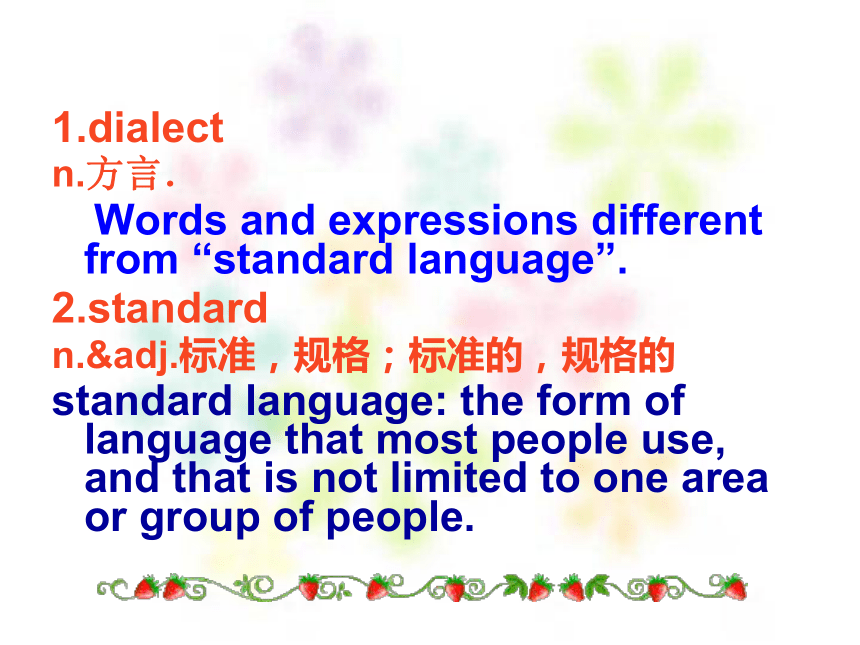 | |
| 格式 | rar | ||
| 文件大小 | 1.8MB | ||
| 资源类型 | 教案 | ||
| 版本资源 | 人教版(新课程标准) | ||
| 科目 | 英语 | ||
| 更新时间 | 2007-09-24 09:18:00 | ||
图片预览

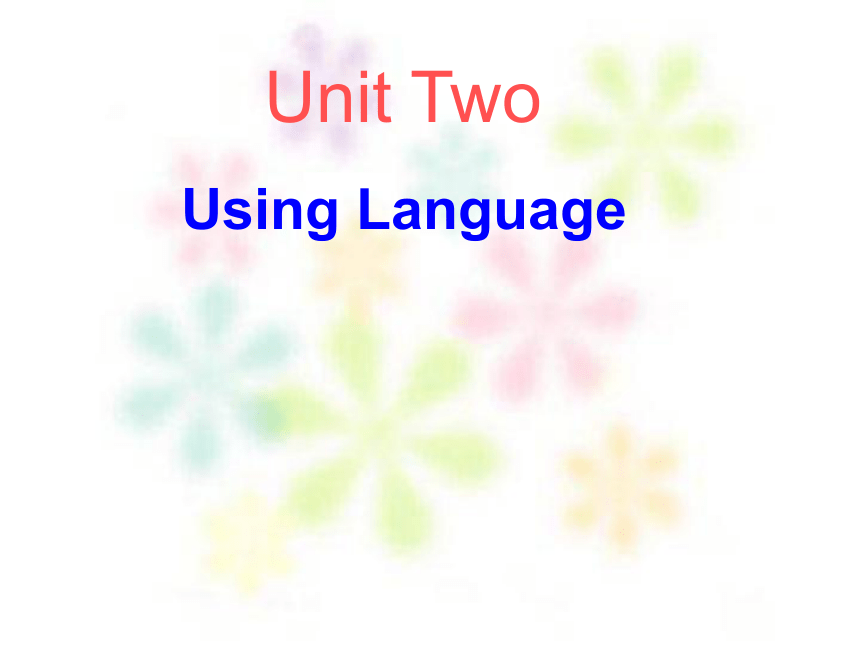
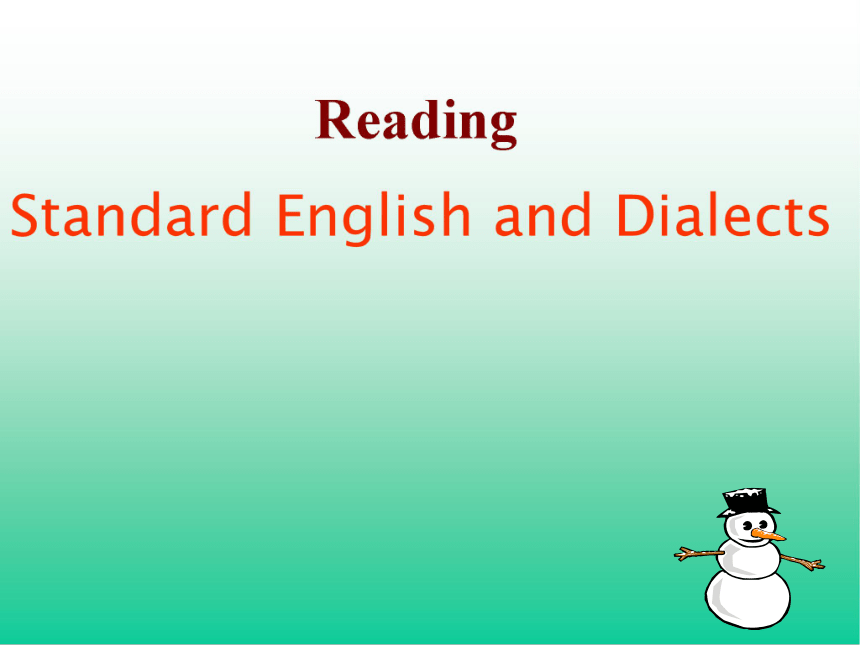

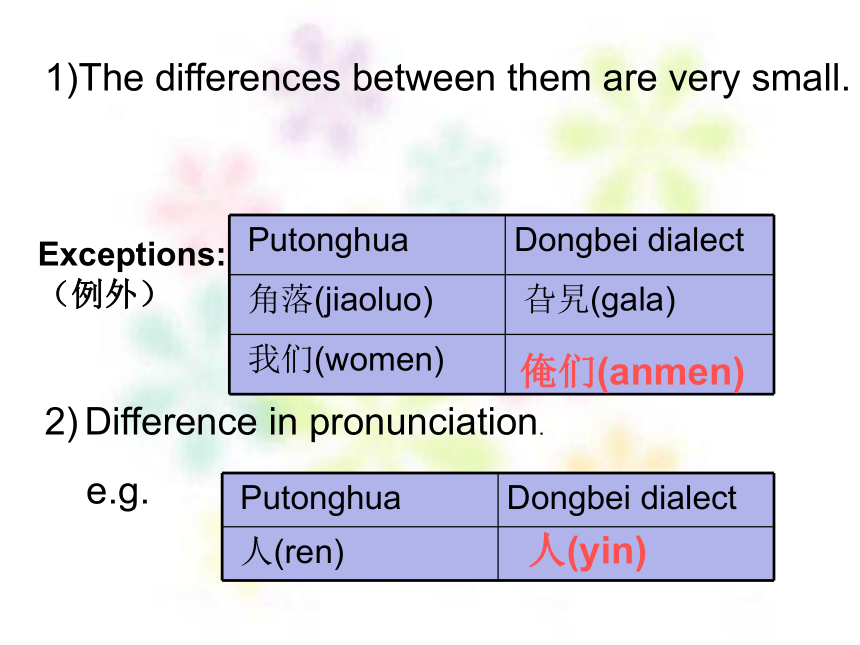
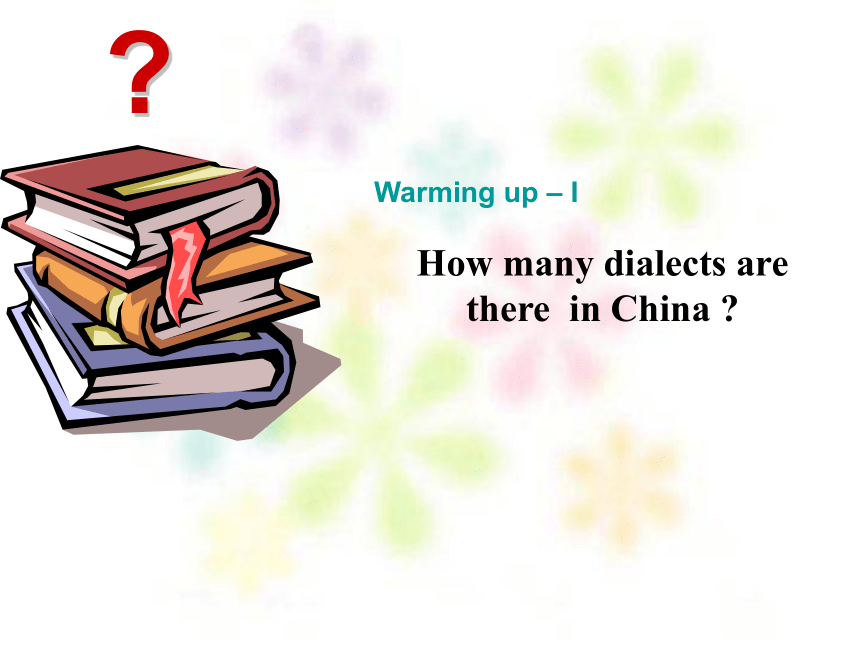
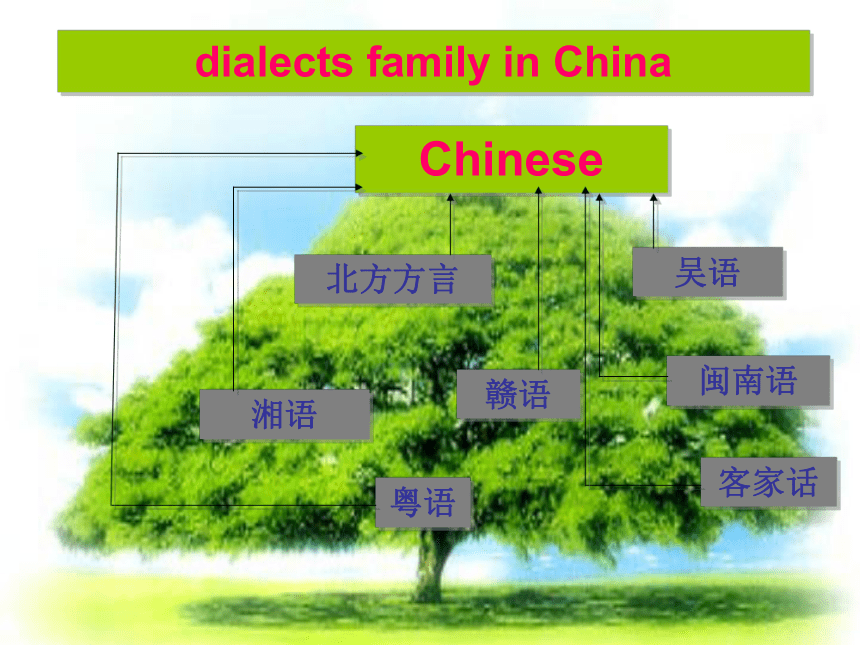

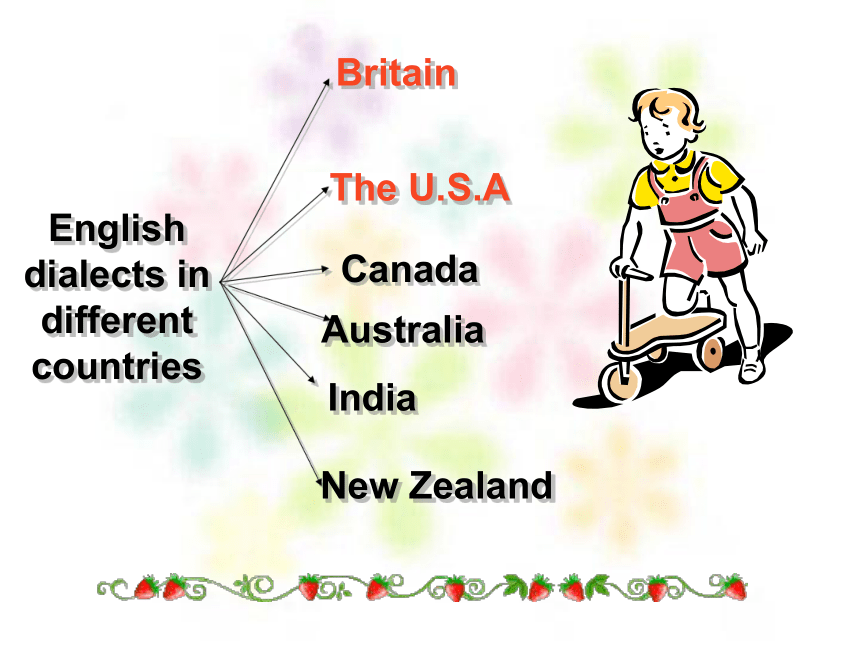
文档简介
课件26张PPT。
1.dialect
n.方言.
Words and expressions different from “standard language”.
2.standard
n.&adj.标准,规格;标准的,规格的
standard language: the form of language that most people use, and that is not limited to one area or group of people.
Unit Two
Using Language Warming up Enjoy the song and tell the differences between Putonghua and Dongbei dialect.The differences between them are very small.
2) Difference in pronunciation.
e.g. Exceptions:(例外) 俺们(anmen) 人(yin)?Warming up – I
How many dialects are there in China ?dialects family in China 北方方言吴语闽南语客家话湘语赣语粤语ChineseWarming up – II Do you think there are some dialects in English?English dialects in different countriesBritainThe U.S.ACanadaAustraliaIndiaNew ZealandReading – I Fast reading: Read the text on page 13 for 1 minute and answer the following question.
Is there standard English?
Reading – II Listening to the tape
Try to find the topic sentence of each paragraph.
Now please listen to the tape!
Topic sentence of paragraph 1
There is no such a thing as standard English.
The main idea for paragraph 2
American English has many dialects whose words and expressions are different from “standard language”.
Topic sentence of paragraph 3
Geography plays a part in making dialects.
Reading – III Detailed Reading Read the text for 3 minutes and answer the following questions.
1.How many dialects of American English have been listed in the text?
2.Why do people from both Northeastern and Southeastern of U.S. speak with almost the same dialect?
3.Why are there so many dialect in American English?1.How many dialects of American English have been listed in the text?
midwestern, southern, African American, Spanish
2.Why do people from both Northeastern and Southeastern of U.S. speak with almost the same dialect?
Because when Americans moved from one place to anther, they took their dialects with them.
3.Why are there so many dialect in American English?
1>That’s because people come from all over the world.
2>And geography plays a part in making dialects.
Language points for Reading II
Useful words& Sentence patterns3.specially & especially (line2, para.2)
specially adv. : 专门(指专为某一目的)
especially adv. :尤其, 特别的,表达事物不寻常或特别重要
eg.1) Our garden is beautiful, __________in autumn.
2) I came here __________ to see you. especiallyspecially4.Recognize (the last line,para.3) <英-recognise> Vt.辨认出来,承认,公认
Recognition n.认识,认出,承
phrases: recognize sb./sth.(by sth.) 识别…
recognize sb./sth. to be 承认…为…
recognize sb./sth. as 承认…认可…
recognize (that) 意识到…;承认…
注: recognize是一个终止性动词,不用于进行时态。是指原来很熟悉,经过一段时间的间隔或别的原因后又重新认出来。Eg. 1>I recognized her by her long hair.
2>They recognized him to be a great leader.
3>I recognize him as a clever man.
4>We recognized that the task was not easy.
Sentence patterns1.Believe it or not ,……(信不信由你)
e.g.1) Believe it or not, I’m going to America tomorrow.
2) Believe it or not, there is no such a thing as standard English. (The 2nd sentence in Para. 1)
注: 1>such修饰单数名词时,放在a (an)前。
2>such与no, all, some, any, few, little, many, much, one等词连用,such应放置于这些词之后。2.play a part/role in
1>be involved in an activity. 参加某活动.
e.g. She plays an active part in the student union.
2>make a contribution to sth; have a share in sth. 对某事起作用,有贡献;参与
e.g. a)She played a major part in the success of the project.
b)We all have a part to play in the fight against crime.
c)Geography also plays a part in making dialects.Activities:1>Please tell an interesting or funny story that shows the difference between dialects in English. (esp. B.E &A.E)
2>If you can’t tell a story, you may discuss why Putonghua is used in China or the advantages of speaking putonghua.
AssignmentReview all the new words and expressions. We will have a dictation next class.
2. Finish Ex.1&2 on page 49.
3. Preview for the next class.Take a break!Thank you
1.dialect
n.方言.
Words and expressions different from “standard language”.
2.standard
n.&adj.标准,规格;标准的,规格的
standard language: the form of language that most people use, and that is not limited to one area or group of people.
Unit Two
Using Language Warming up Enjoy the song and tell the differences between Putonghua and Dongbei dialect.The differences between them are very small.
2) Difference in pronunciation.
e.g. Exceptions:(例外) 俺们(anmen) 人(yin)?Warming up – I
How many dialects are there in China ?dialects family in China 北方方言吴语闽南语客家话湘语赣语粤语ChineseWarming up – II Do you think there are some dialects in English?English dialects in different countriesBritainThe U.S.ACanadaAustraliaIndiaNew ZealandReading – I Fast reading: Read the text on page 13 for 1 minute and answer the following question.
Is there standard English?
Reading – II Listening to the tape
Try to find the topic sentence of each paragraph.
Now please listen to the tape!
Topic sentence of paragraph 1
There is no such a thing as standard English.
The main idea for paragraph 2
American English has many dialects whose words and expressions are different from “standard language”.
Topic sentence of paragraph 3
Geography plays a part in making dialects.
Reading – III Detailed Reading Read the text for 3 minutes and answer the following questions.
1.How many dialects of American English have been listed in the text?
2.Why do people from both Northeastern and Southeastern of U.S. speak with almost the same dialect?
3.Why are there so many dialect in American English?1.How many dialects of American English have been listed in the text?
midwestern, southern, African American, Spanish
2.Why do people from both Northeastern and Southeastern of U.S. speak with almost the same dialect?
Because when Americans moved from one place to anther, they took their dialects with them.
3.Why are there so many dialect in American English?
1>That’s because people come from all over the world.
2>And geography plays a part in making dialects.
Language points for Reading II
Useful words& Sentence patterns3.specially & especially (line2, para.2)
specially adv. : 专门(指专为某一目的)
especially adv. :尤其, 特别的,表达事物不寻常或特别重要
eg.1) Our garden is beautiful, __________in autumn.
2) I came here __________ to see you. especiallyspecially4.Recognize (the last line,para.3) <英-recognise> Vt.辨认出来,承认,公认
Recognition n.认识,认出,承
phrases: recognize sb./sth.(by sth.) 识别…
recognize sb./sth. to be 承认…为…
recognize sb./sth. as 承认…认可…
recognize (that) 意识到…;承认…
注: recognize是一个终止性动词,不用于进行时态。是指原来很熟悉,经过一段时间的间隔或别的原因后又重新认出来。Eg. 1>I recognized her by her long hair.
2>They recognized him to be a great leader.
3>I recognize him as a clever man.
4>We recognized that the task was not easy.
Sentence patterns1.Believe it or not ,……(信不信由你)
e.g.1) Believe it or not, I’m going to America tomorrow.
2) Believe it or not, there is no such a thing as standard English. (The 2nd sentence in Para. 1)
注: 1>such修饰单数名词时,放在a (an)前。
2>such与no, all, some, any, few, little, many, much, one等词连用,such应放置于这些词之后。2.play a part/role in
1>be involved in an activity. 参加某活动.
e.g. She plays an active part in the student union.
2>make a contribution to sth; have a share in sth. 对某事起作用,有贡献;参与
e.g. a)She played a major part in the success of the project.
b)We all have a part to play in the fight against crime.
c)Geography also plays a part in making dialects.Activities:1>Please tell an interesting or funny story that shows the difference between dialects in English. (esp. B.E &A.E)
2>If you can’t tell a story, you may discuss why Putonghua is used in China or the advantages of speaking putonghua.
AssignmentReview all the new words and expressions. We will have a dictation next class.
2. Finish Ex.1&2 on page 49.
3. Preview for the next class.Take a break!Thank you
